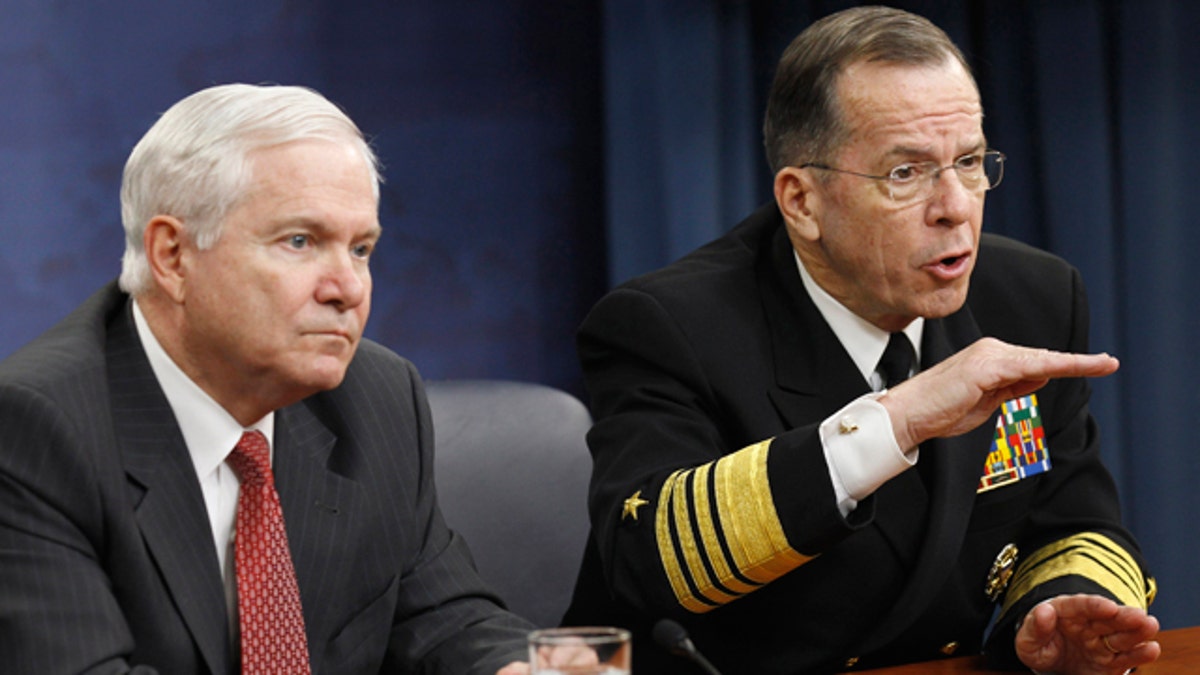
March 1, 2011: Defense Secretary Robert Gates, left, and Joint Chiefs Chairman Adm. Mike Mullen take part in a news conference at the Pentagon. (AP)
WASHINGTON -- Defense Secretary Robert Gates announced Tuesday more orders for U.S. warships and military personnel to head to the Mediterranean Sea near Libya, but showed an overall reluctance to involve the U.S. military on the ground in Libya or to establish a "no-fly zone" overhead.
"The U.N. Security Council resolution provides no authorization for the use of armed force; there is no unanimity within NATO for the use of armed force... and we also have to think about, frankly, the use of the U.S. military in another country in the Middle East," Gates said. "So I think we are sensitive about all these things, but we will provide the president with a full range of options."
Gates ordered 400 Marines to deploy from the United States to join the USS Kearsarge, an amphibious assault ship with orders to pass through the Suez Canal into the Mediterranean.
The Kearsarge is down 1,400 Marines who are currently fighting in southern Afghanistan. He also ordered the USS Ponce to the Mediterranean, a landing platform ship with the ability to move a large amount of supplies and troops onto shore.
When the Kearsarge and Ponce arrive that will bring the total number of surface warships in Mediterranean Sea to five. They'll join the USS Stout and the USS Barry (both destroyers) as well as the USS Mount Whitney, as naval command ship. Navy officials have also told Fox News at least one submarine is in the area.
Gates said the military is keeping a close eye on embattled Libyan leader Muammar al-Qaddafi’s stockpile of mustard gas, adding security around those installations appears to have increased.
The White House has said repeatedly this week that repositioning forces keeps all options on the table, from military intervention to the distribution of humanitarian aid.
Earlier Tuesday, Gen. James Mattis, the head of U.S. Central Command, offered a stern reminder to Congress that establishing a "no-fly zone" over Libya would involve combat and serious risks.
"You would have to remove air defense capability in order to establish a no-fly zone," Mattis said. "So no illusions here, it would be a military operation. It wouldn't be just telling people not to fly airplanes."
Meanwhile, Gates and Admiral Mike Mullen, head of the Joint Chiefs of Staff, both said they are optimistic about the revolutions sweeping the Middle East right now and claimed they are a direct affront to Al Qaeda.
"I'm optimistic that there is a chance for stability," Mullen said.
"I'm an optimist about these changes," Gates said, describing them as "an enormous setback for Al Qaeda."
"It basically gives the lie to Al Qaeda's claim that the only way to get rid of authoritarian governments is through extremist violence. And the peoples of several countries in the region are proving this not to be the case," Gates said.




